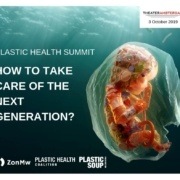What’s the deal with the Plastic Soup again?
March 15 2024 That’s what readers of news site nu.nl on their comment platform Nujij were wondering. In a recent […]
Amsterdam, 16 July 2019 – Most major banks and insurers in the Netherlands invest heavily in companies that extract shale gas and produce plastics. ING is the largest financier of shale gas and plastics. Aegon and Allianz are the largest investors. Between 2010 and this year, the banks a total of 5.3 billion dollars to the gas and plastic companies examined. Banks and insurers invest 4 billion dollars in these companies.
This was established by the new practical research of the Fair Banking and Insurance Guide in collaboration with the Plastic Soup Foundation. Click here to read the report Plastic Finance; How Dutch financial institutions enable shale gas to fuel the plastic soup disaster. The report establishes the first direct relationship between investments in shale gas and plastic production and the increase in plastic soup on rivers, seas and oceans.
Fracking for Plastic
Due to cheap shale gas, production or (packaging) plastic has been increasing considerably. Since 2010, no less than 204 billion dollars has been invested in the United States in the expansion of plastic production based on ethane, a component or shale gas. Ethane is also transported to Europe with mammoth tankers. New plastic plants are being built in Antwerp to crack this ethane. Ethane is cheaper than the petroleum derivative naphta, traditionally used as raw material used for production of plastic. Ethane is used to make ethylene, a basis for all types of plastics such as PET and polyethylene.
Shale gas extraction is also a growing industry in Argentina. But plastic production is just one of many reasons why shale gas does not fit into a sustainable investment strategy. During loading, transport and handling of virgin plastic, many nurdles (the industrial base pellet) and up in the environment. These small plastic pellets are used as a semi-finished product in the production of virtually all plastic products.
Investments by Dutch banks and insurance companies
The seven largest Dutch banks and the nine largest insurance groups in the Netherlands were investigated by the Fair Banking and Insurance Guide. Insurers Aegon and Allianz were found to be the largest investors in shale gas and plastics. On the reference date (18-20 February of this year), the stock portfolios of the joint Dutch banks and insurance companies in this sector had a total value of almost 4 billion dollars.
When it comes to loans, ING is largest by far, followed by ABN Amro. These figures are found in public sources on the financing of the ten selected shale gas and plastic companies. The total investments in shale gas and plastic companies are probably much higher.
Shale gas and plastic: a blind spot
The adverse effects of shale gas extraction on the environment and climate are well-known and are an increasing topic of conversation among investors. The direct relationship between shale gas and the production of plastic and, consequently, the leakage of plastic disposable products into the plastic soup in seas is underexposed and unknown to many market parties.
As a result of their investments in companies such as Shell, Exxon Mobil, DowDuPont and Chevron, banks and insurers play a role in the rapid growth of plastic production. All banks and insurers say they embrace the United Nations Sustainable Development Goals (SDGs). These goals also include protection of the climate and the oceans. Investments in shale gas companies and companies that produce plastics are directly opposed to achieving the SDGs.
Bank’s claim to worry about the plastic soup, but often have no policy regarding investment in plastic production. Rabo, NIBC, Volksbank (including ASN) and Triodos exclude, in whole or in part, investment companies that realize their turnover from the extraction of shale gas. ING’s policy allows shale gas extraction outside Europe only. No clear policy was found among the other banks and insurers. When it comes to investments in plastic and / or plastic producing companies, only Triodos and Volksbank have restrictive policy. The Fair Bank Guide, Fair Insurance Guide and Plastic Soup Foundation encourage all banks and insurers to clarify their investment policy and place shale gas on the exclusion list of investments.
The Fair Money Guide
The Fair Money Guide examines whether banks and insurance companies do not invest your money in things like animal abuse, arms trafficking or child labor. On their website anyone can check the scores or banks and insurers on these and other topics. The Fair Money Guide, which consists of the Fair Bank Guide and the Fair Insurance Guide, is a collaboration of Amnesty International, FNV, Milieudefensie (Friends of the Earth Netherlands), Oxfam Novib, PAX and World Animal Protection. Plastic Soup Foundation supports the objective of the Fair Money Guide on the plastic issue. Send the banks and insurers a complaint or tweet via the website honestegeldwijzer.nl
Also read – Press release Fair money guide
Also read – Does the Rutte Cabinet really want less plastic?
Also read – Ineos invests 3 billion euros in plastic plants in Antwerp
March 15 2024 That’s what readers of news site nu.nl on their comment platform Nujij were wondering. In a recent […]
The first Impact Fair is Europe’s largest Impact Experience. An interactive ‘immersive’ experience of impactful examples.
The waste-export to countries outside of the EU has been restricted The Netherlands is against a carpet ban on shipping of plastic waste.
The waste-export to countries outside of the EU has been restricted The Netherlands is against a carpet ban on shipping of plastic waste.

 Amsterdam’s Club Nyx ditches plastic straws
Amsterdam’s Club Nyx ditches plastic straws